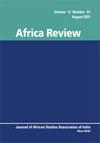津巴布韦2000年后以性工作为基础的生计
IF 0.5
Q4 AREA STUDIES
引用次数: 3
摘要
摘要本文考察了性工作作为满足女性短期和长期需求的谋生机会所扮演的角色。2000年后,津巴布韦经历了一场重大的社会经济危机,最终导致世界创纪录的通货膨胀率、普遍贫困、高失业率、粮食和现金短缺。这种情况在2008年达到顶峰,该国暂停了其货币,并采用了一种多货币体系,美元作为交换方式获得了突出地位。性工作在殖民时期和后殖民时期的津巴布韦有着悠久的历史,但2000年后的时期需要对这种生计活动如何随着不断变化的宏观经济背景而演变进行细致入微的分析。参与性观察和对女性性工作者的非结构化访谈表明,她们有能力积极应对宏观经济变化。性工作者所表现出的能力描述了他们如何在津巴布韦的危机和恶性通货膨胀的背景下进行调整。调查结果表明,尽管工作条件恶劣,但性工作者的收入流入有所增加,这已经转化为改善了生计,而津巴布韦对性工作的刑事定罪和惩罚加剧了这种恶劣的工作条件。因此,本文认为性工作是一个职业部门,参与者在加入性工作时做出了理性的选择。本文章由计算机程序翻译,如有差异,请以英文原文为准。
Sex work-based livelihoods in post 2000 in Zimbabwe
ABSTRACT The paper examines the role sex work played as a livelihood opportunity for women to meet short and long term needs. Post 2000 Zimbabwe underwent a major socioeconomic crisis which culminated in world record inflation rates, widespread poverty, high unemployment, food and cash shortages. This culminated in 2008 where the country suspended its currency and adopted a multi-currency system with the American dollar gaining prominence as the mode of exchange. Sex work has a long history in colonial and post-colonial Zimbabwe but post 2000 period requires a nuanced analysis of how this livelihood activity has evolved in response to the ever-changing macroeconomic context. Participant observation and unstructured interviews with female sex workers point towards their ability to actively respond to macroeconomic changes. Agency demonstrated by sex workers characterizes how they adjusted through the context of crisis and hyperinflation in Zimbabwe. The findings point to an increased inflow of income for sex workers which have translated to an improved livelihood despite poor working conditions which are reinforced by criminalization and penalization of sex work in Zimbabwe. The paper thus argues that sex work is an occupational sector with participants who make rational choices in joining sex work.
求助全文
通过发布文献求助,成功后即可免费获取论文全文。
去求助
来源期刊

Africa Review
AREA STUDIES-
CiteScore
1.80
自引率
12.50%
发文量
22
期刊介绍:
Africa Review is an interdisciplinary academic journal of the African Studies Association of India (ASA India) and focuses on theoretical, historical, literary and developmental enquiries related to African affairs. The central aim of the journal is to promote a scholarly understanding of developments and change in Africa, publishing both original scholarship on developments in individual countries as well as comparative analyses examining the wider region. The journal serves the full spectrum of social science disciplinary communities, including anthropology, archaeology, history, law, sociology, demography, development studies, economics, education, gender studies, industrial relations, literature, politics and urban studies.
 求助内容:
求助内容: 应助结果提醒方式:
应助结果提醒方式:


